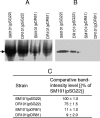Antisense-RNA-mediated decreased synthesis of small, acid-soluble spore proteins leads to decreased resistance of clostridium perfringens spores to moist heat and UV radiation
- PMID: 17259355
- PMCID: PMC1855649
- DOI: 10.1128/AEM.02500-06
Antisense-RNA-mediated decreased synthesis of small, acid-soluble spore proteins leads to decreased resistance of clostridium perfringens spores to moist heat and UV radiation
Abstract
Previous work has suggested that a group of alpha/beta-type small, acid-soluble spore proteins (SASP) is involved in the resistance of Clostridium perfringens spores to moist heat. However, this suggestion is based on the analysis of C. perfringens spores lacking only one of the three genes encoding alpha/beta-type SASP in this organism. We have now used antisense RNA to decrease levels of alpha/beta-type SASP in C. perfringens spores by approximately 90%. These spores had significantly reduced resistance to both moist heat and UV radiation but not to dry heat. These results clearly demonstrate the important role of alpha/beta-type SASP in the resistance of C. perfringens spores.
Figures




References
-
- Cabrera-Martinez, R. M., J. M. Mason, B. Setlow, W. M. Waites, and P. Setlow. 1989. Purification and amino acid sequence of two small, acid-soluble proteins from Clostridium bifermentans spores. FEMS Microbiol. Lett. 52:139-143. - PubMed
-
- Cabrera-Martinez, R. M., and P. Setlow. 1991. Cloning and nucleotide sequence of three genes coding for small, acid-soluble proteins of Clostridium perfringens spores. FEMS Microbiol. Lett. 61:127-131. - PubMed
-
- Gerhardt, P., and R. E. Marquis. 1989. Spore thermoresistance mechanisms, p. 43-63. In I. Smith, R. Slepecky, and P. Setlow (ed.), Regulation of prokaryotic development. American Society for Microbiology, Washington, DC.
Publication types
MeSH terms
Substances
Grants and funding
LinkOut - more resources
Full Text Sources

